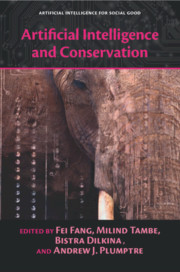Crossref Citations
This Book has been
cited by the following publications. This list is generated based on data provided by Crossref.
Bucci, Melanie E.
2019.
Books and Literature.
The Journal of Wildlife Management,
Vol. 83,
Issue. 6,
p.
1476.
Bakker, Karen
Knight, Rosemary
Leape, Jim
Mackworth, Alan
Ng, Raymond
and
Ritts, Max
2020.
Digital Technologies and Dynamic Resource Management.
p.
368.
Duporge, Isla
Hodgetts, Timothy
Wang, Tiejun
and
Macdonald, David W.
2020.
The spatial distribution of illegal hunting of terrestrial mammals in Sub-Saharan Africa: a systematic map.
Environmental Evidence,
Vol. 9,
Issue. 1,
Rozov, K. V.
2020.
About the need to change the content of professional training of a future informatics teacher in artificial intelligence.
Informatics and education,
p.
12.
Bohlen, Marc
Jain, Raunaq
Sujarwo, Wawan
and
Chandola, Varun
2021.
From images in the wild to video-informed image classification.
p.
656.
Oręziak, Bartłomiej
2021.
ZASADY ODPOWIEDZIALNOŚCI PRAWNEJ TZW. SZTUCZNEJ INTELIGENCJI NA PODSTAWIE RZYMSKICH REGULACJI DOTYCZĄCYCH NIEWOLNIKÓW.
Zeszyty Prawnicze,
Vol. 21,
Issue. 2,
p.
41.
Duberry, Jérôme
2021.
Intelligence artificielle, données volumineuses et conservation de la biodiversité..
VertigO,
Vol. 21-2,
Issue. ,
Kartik, Dhruva
Nayyar, Ashutosh
and
Mitra, Urbashi
2022.
Common Information Belief based Dynamic Programs for Stochastic Zero-sum Games with Competing Teams.
p.
605.
Dancer, Anthony
Keane, Aidan
Beale, Colin M.
Dobson, Andrew D. M.
Amin, Rajan
Freeman, Robin
Imong, Inaoyom
Jones, Kate
Linkie, Matthew
Long, Barney
Okeke, Francis O.
Plumptre, Andrew J.
Rowcliffe, J. Marcus
Stokes, Emma J.
van der Westhuizen, Elsabé
and
Collen, Ben
2022.
Evidence of deterrence from patrol data: Trialling application of a differenced‐CPUE metric.
Conservation Science and Practice,
Vol. 4,
Issue. 8,
Zhang, Xuan
Campomizzi, Andrew J.
and
Lebrun‐Southcott, Zoé M.
2022.
Predicting population trends of birds worldwide with big data and machine learning.
Ibis,
Vol. 164,
Issue. 3,
p.
750.
Martínez-Tabares, Fernando
and
Orozco-Alzate, Mauricio
2022.
Advances in Artificial Intelligence – IBERAMIA 2022.
Vol. 13788,
Issue. ,
p.
121.
Hahn, Nathan R.
Wall, Jake
Denninger‐Snyder, Kristen
Sairowua, Wilson
Goss, Marc
Ndambuki, Stephen
Eblate, Ernest
Mbise, Noel
Kiambi, Sospeter
and
Wittemyer, George
2023.
Staging behaviours identify spatial and temporal risk of human‐wildlife conflict.
Journal of Applied Ecology,
Vol. 60,
Issue. 7,
p.
1495.
Bennamoun, Nora
Campera, Marco
Tully, Gregg
and
Nekaris, K.A.I.
2023.
COVID-19’s Impact on the Pan African Sanctuary Alliance: Challenging Times and Resilience from Its Members.
Animals,
Vol. 13,
Issue. 9,
p.
1486.
Sharma, Manoj Kumar
Prasad, Somarouthu V. G. V. A.
Anusha, G.
Das, Abhijeet
and
Sambathkumar, M.
2024.
Environmental Applications of Carbon-Based Materials.
p.
1.
DePuy, Walker
Thung, Paul
Schreer, Viola
and
Erb, Wendy M.
2025.
Navigating scale and interdisciplinary dynamics in conservation social science.
Conservation Biology,
Vol. 39,
Issue. 2,



